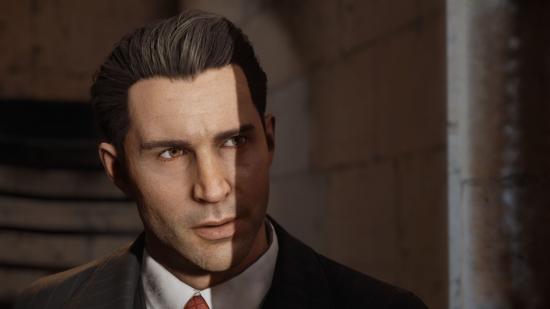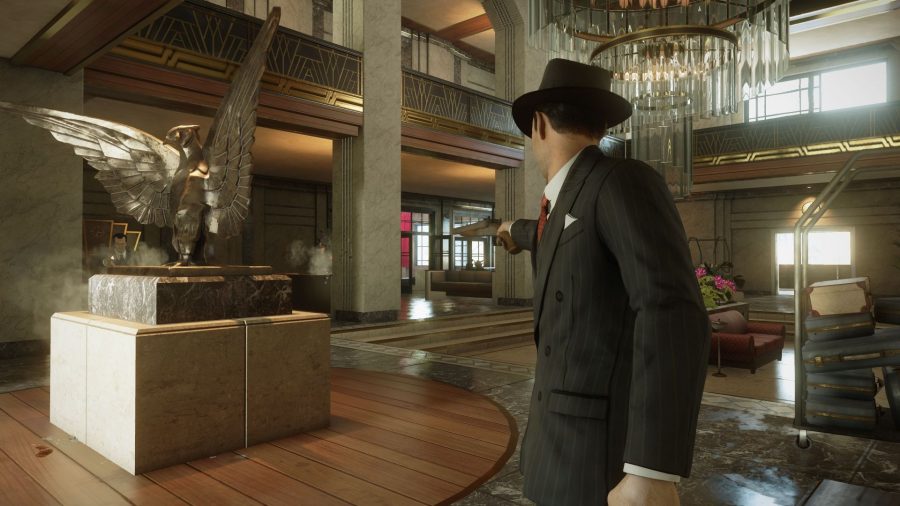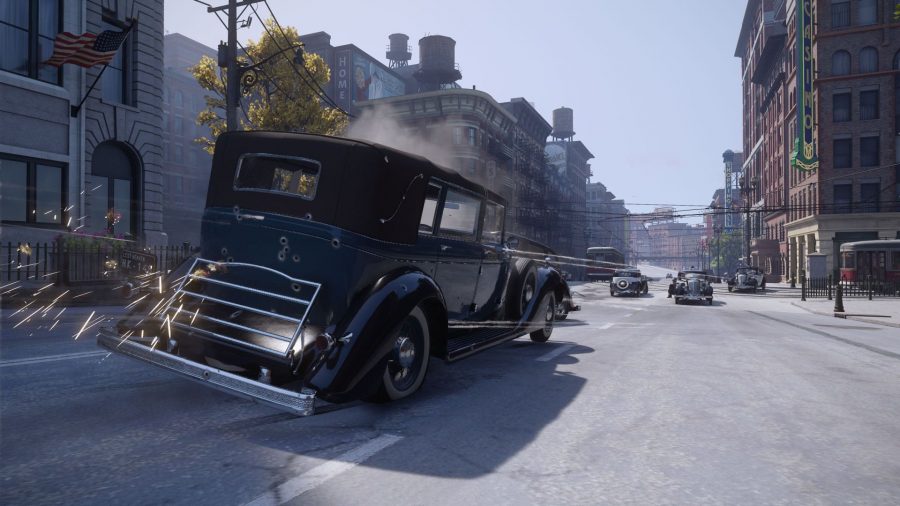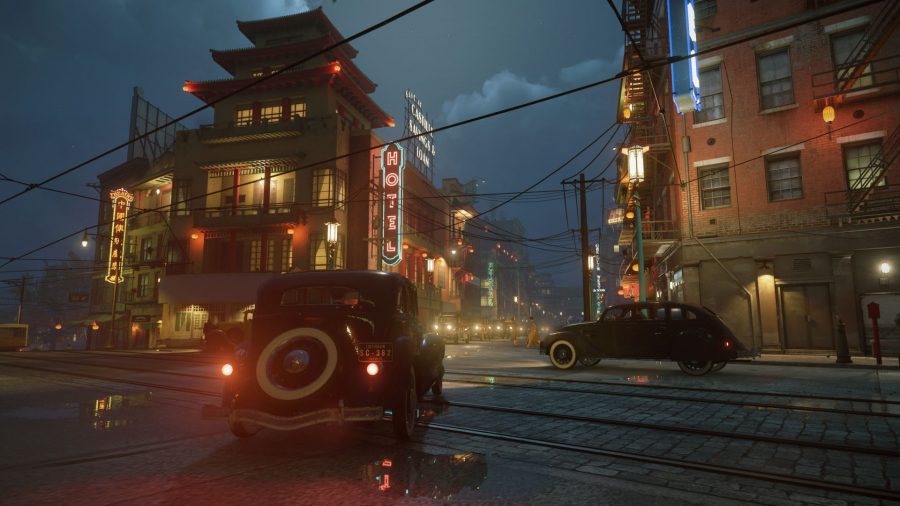If you’re a crime games fan, you’ll no doubt have heard Mafia – yes, the 2002 game – is being treated to a “built-from-the-ground-up” remake. Mafia: Definitive Edition will essentially have the bones and blueprint of the original, but will feature all-new technology, voice acting, game mechanics, and more, transforming it into a modern experience on par with the latest title in the series, Mafia III.
Since the action-adventure game’s announcement earlier this year, developer Hangar 13 and publisher 2K have shared brief glimpses of the remake, including a trailer that (re)introduces us to its star, cabbie-turned-mafioso Tommy Angelo, and a clip teasing ten seconds of Mafia: Definitive Edition gameplay. Now, 2K’s unveiled a generous 12-minute chunk of gameplay for us to check out ahead of the game’s launch in September, which you can see embedded below – but there’s still plenty more to ascertain about what the remake will bring.
To find out more about how and why the remake came to be, how Hangar 13 is striking the balance between the old and the new, and why Tommy Angelo’s journey from happy-go-lucky cab driver to a made man who’s kind of in over his head is worth revisiting, we spoke to Devin Hitch, lead producer at Hangar 13.
PCGamesN: Why did Hangar 13 and 2K decide to remake Mafia?
Devin Hitch: After Mafia III, a large portion of the team went to work on three DLC story expansions, myself included. While we were off working on that, our studio leadership – including our director Haden Blackman – wanted to talk about what would be next.
A lot of ideas were kicked around, but one that kept getting brought up was, ‘What if we could have all the Mafia games available for fans of this current console generation to experience, all in the same place?’ That was the big idea that started at all.
From there, they arrived on the idea of the Mafia Trilogy, and that we’d be able to remaster Mafia II because it was a bit more modern in terms of graphics, gameplay style, and technology to get it running on current hardware, but that Mafia – because it came out in 2002 – would need a full remake from the ground up. So we realised the challenge was, ‘Can we use the tools and technology that we developed internally – we have our own proprietary engine for Mafia III – to rebuild Lost Heaven and to bring all the characters of the Salieri crime family back to life?’
PCGN: What is it about the first Mafia game, and the story of Tommy Angelo, that will bring both new and returning players on board?
DH: For returning players, we wanted to deliver that feeling of nostalgia you get when you return to a game that you absolutely love. That nostalgia comes from two places. The first is its setting: this is the 1930s, America right at the height of probation. It’s set in our fictionalised midwestern city of Lost Heaven, focusing on a gang war between the rival Salieri and Morello families. So you have this absolutely classic mafia time period where, even if you didn’t play the original, if you like this genre of crime/mafia movies, it’s going to draw you in. New players will really enjoy that.
Among fans who played the original, there’s also a universal appreciation for the story and characters. As Tommy Angelo, you are a cab driver who haplessly falls into the mob by accident, and all of a sudden you realise that you’re being accepted as part of the family. It’s not just about being a made man and having nice clothes or a nice car, because you don’t see that aspect in the original. It’s more about the relationships within the family, the different motivations on show that kind of comes to a head in the final confrontation at the very end of the art gallery.
PCGN: Tommy is likeable, even if he is in the mafia. Was it your aim to portray him sympathetically, and if so, how do you balance that against his criminal, violent actions?
DH: That’s one of the tricks with any sort of action-adventure third-person shooter game. Ultimately, you are taking control of someone who’s going to go out and do some pretty terrible things, but you have to feel some affinity towards them. I think we had a really strong foundation with the original Mafia – Tommy is pretty likeable. I think his motivations are clearly loyalty to the Salieri family, loyalty to his own family, his girlfriend (and eventually wife) Sarah, and how to balance those things together.
Loyalty to the Salieri family manifests itself in a different way, where he’s off doing heists and running into the Morello family. It’s a concession players of these types of games make – you’re going to go off and be on violent adventures. But you have to find some kernel within the character that players can relate to, and it’s that value of loyalty, and that dilemma of how you balance those obligations against your regular life, that people found so endearing about Tommy as a character, and that we tried to lean into.
PCGN: Did you find Tommy’s development in the original was strong enough to recreate in the remake, or did you have to add other layers to him as a character?
DH: The original game did a great job of getting Tommy’s characterisation there. He’s kind of a strong, silent type, and it’s some of the things that he doesn’t say that I think give him a lot of character. Something we’re really excited about is re-doing all the cinematics – a lot of things come through in Tommy’s performance [now] that are more subtle, and allow us to communicate more about his character.
One of the areas we did expand on, though, is filling in some additional details around the characters around Tommy. For example, his girlfriend Sarah, in the original game, is fairly two-dimensional. She’s kind of hanging out at the bar – she’s Luigi the grizzled bartender’s daughter, so she has a reason to be there – but you don’t really understand what her motivations are.
We’ve expanded on her as a character. She has more scenes, more dialogue. You get to understand more about her and Tommy’s early relationship, you get to see them flirting a little. You also get to see how she reacts to Tommy’s trajectory of going from a happy-go-lucky cab driver, to a made man who’s kind of in over his head at the very end of the game.
We’ve tried to do that, too, with some of the other characters – to paint some ambiguity in their motivations. We’ve added some more light-hearted, colourful moments to the game. For example, Vicenzo was a fairly serious character in the original, and in the Definitive Edition he’s a kind of comic relief, just a super likeable tough guy. He’s the type of guy that I would like to go have a beer with and listen to his stories, and he doesn’t come off that way quite as much in the original.

PCGN: How do you strike the balance between preserving the spirit of the original game and updating it in the remake?
DH: We largely wanted to keep the story the same. We have all of the same missions, they’re all returning, all of the major mission beats that occur are in there. The area where we wanted to introduce some new things, and had to figure out where that balance was, was with some of the new gameplay features.
The original 2002 Mafia is third-person shooter but it plays very much like a first-person shooter, where you’re strafing to take cover, things like that. We had to consider how to take the more modern cover shooter mechanics that we developed in Mafia III and augment those to support the story and the type of combat that we wanted in Mafia I.
That’s a good example where we dialled back the frenetic combat in Mafia III to be more representative of combat between the Salieri and the Morello gang, or between police officers and Tommy.
We did also work on the driving model. The original Mafia had some very slow vehicles and was very realistic – you could even turn on some simulation things like how much gas you had in your tank. We had to find that balance of staying true to the actual car speeds of the time versus having more exciting, arcade-y driving closer to Mafia III.
But we know there are fans of the original who really enjoyed that simulation, so we have a simulation driving mode – you can turn on manual shifting – and a simulation police mode where they’ll ticket you for small infractions like they did in the original. In all these things we tried to balance what we had done with what fans of the original who enjoyed some of those simulation aspects of the original game would appreciate.
In terms of developing the city, we knew we wanted to have all of the neighbourhoods, all of the very distinct landmarks. Whether it’s the Giuliano bridge, or the main church in downtown, you’ll see all of those things returning. We wanted to change the city layout to be more drivable, so we didn’t feel burdened by taking a top-down view of the original game’s city and trying to recreate that block-for-block. We tried to lean more towards being true to the original when it came to the story and cinematics, the gameplay beats, all that stuff.
PCGN: To what extent do you think Mafia as a series, and this remake, offer something unique compared to others in the action-adventure genre?
DH: I really enjoyed working on Definitive Edition because this is one of the only triple-A videogame experiences where you get to play a classic mob movie. There aren’t really any other franchises out there that allow you to tap into this kind of 1930s prohibition, American gangster stuff. I think this sets us apart from other triple-A third person, open-world action experiences.
PCGN: How did you recreate the feeling and look of a Prohibition-era city in the remake? Did you use sort of other historical sources?
DH: Our creative director Alex Cox works with a lot of our writers, world artists, and designers to pull lots of different reference material. Not only did we look at the original game, but we looked at movies, we went back through a lot of old newspaper headlines to see what it was like during prohibition during this time, what it was like after the Great Depression. One of the things that we did was try to incorporate some of that era signage and things like that.
We wanted to try to use environmental storytelling, especially in the ambient city to really hammer home what was happening at the time.
Over the course of the eight years that the game takes place from – 1930 to 1938 – we go from a prohibition city to post-prohibition, so we do play with that where some things change. Some things change immediately in the city, but also at the Salieri bar you’ll see the bar itself evolve over time as it goes from the happy-go-lucky start where the boys and Salieri are getting into more small-time crime, to the war state once things really turn sour between Salieri’s gang and Morello’s gang.
PCGN: How would you say Mafia: Definitive Edition’s difficulty compares to Mafia II and Mafia III?
DH: One of the things about the original Mafia was that it was actually a very difficult game. It had a classic difficulty mode that was the hardest, and it affected all aspects of the game, from normal moment-to-moment combat with enemies and the police, to the racing difficulty. We have been focus-testing the game with fans of the original and trying out our classic difficulty, and one of the things they come back and they say is: ‘Wow, this race is really as hard as it was in the original’.
We have settings for all types of players, whether it’s aim assist or some more forgiving health regeneration. But if you want to play on classic difficulty with simulated driving and simulated police, where they’re going to ticket you for an illegal left turn or running a red light, we’ve got all of those options for you.
Fans of the original who liked that more punishing classic difficulty will have something to challenge themselves with here. It’s been a point of honour on the dev team if you’ve been able to complete the race on classic difficulty! I can’t wait for our fans who really enjoy that level of difficulty to try it out themselves.
Mafia: Definitive Edition is due to launch on September 25.




